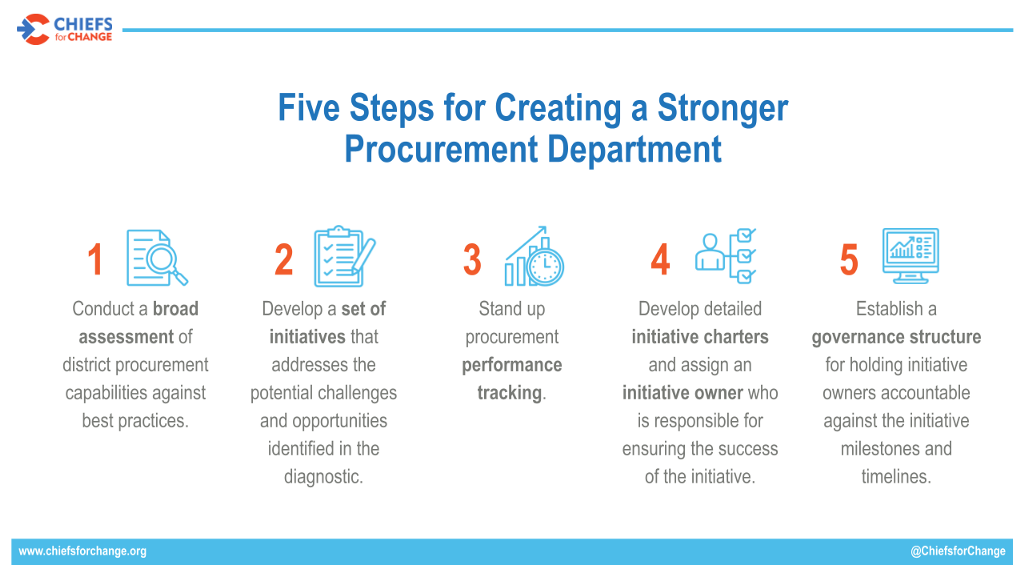During his two terms over 13 years as superintendent in Dallas, Michael Hinojosa took on what he called some tough stuff. “It’s hard to improve student achievement from 43 F schools to 4… we solved those kinds of problems,” Hinojosa recalled. “But we couldn’t solve this issue” with procurement — at least not until the very end.
Hinojosa, a member of Chiefs for Change, joined Robert Avossa, the former superintendent of The School District of Palm Beach County, at the Future of Education Finance Summit in Baltimore on September 22. During the session for education finance professionals, the leaders discussed how they turned procurement around in Dallas. Avossa, who is a chief in residence with Chiefs for Change, supported the Dallas team as an advisor to the technical assistance project.
To understand what they did, it’s important to first know where they started. “This was a hot mess,” Hinojosa said. There were the scandals: a former Dallas superintendent who went to federal prison for using district funds to buy furniture for her apartment; the former chief technology officer, also sent to prison, after he struck a deal with a vendor to use fishing boats in Key West; a former secretary in the superintendent’s office who bought Louis Vuitton purses using her district procurement card.
Then, there were issues with the processes put in place to prevent such scandals.
“For 13 years, this was my Achilles’ heel, and so what happened is they put in so many rules,” Hinojosa said.
“You wind up overcorrecting,” Avossa added. “Now it’s so rigid — that to buy a $500 product for a teacher, takes six weeks, and then people say, ‘Why are we going so slow?’”
“They had multiple approvals that were totally unnecessary,” Hinojosa said at another point. “It was CYA. The code of arms in Dallas ISD used to be: Blame somebody else. They had to CYA. They were pointing at somebody else. They wouldn’t accept responsibility. That was really important for us to go from a culture of entitlement to a culture of accountability.”

If he didn’t fix the problems, Hinojosa knew it would be disastrous for kids at a time when the district needed to urgently deliver products and services to schools. Dallas launched a number of new programs during the Covid-19 pandemic to support students in their learning and their overall wellbeing. It paid for these programs, in large part, with time-bound federal Covid relief aid. Some initiatives required new procurement schedules. For example, the typical cycle was not going to work for getting supplies for enhanced summer programming. Similarly, new Reset Centers to address behavioral issues needed specialized furniture right away to create the kind of environment that can help struggling kids get back on track.
As a member of Chiefs for Change, Hinojosa was able to tap into technical assistance support provided by the network. “We were very fortunate that Chiefs asked me, ‘What [is] your pain point?’ And it was a very easy answer. It was procurement,” he said.
The technical assistance team began by conducting a rapid diagnostic. “Part of this was ensuring that we went and fully understood the context in the district,” Avossa told the audience. “And the first part of that is to conduct a broad assessment of what is happening in the current system. We were able to go and spend some time talking to the end users… with the teachers, the principals, the central office folks who really were struggling with trying to figure out a way to procure the services and products that they needed.”
Avossa explained that the team produced process maps to lay out the steps that someone needed to follow to go from ordering a product to receiving it — or to go from applying to become a vendor to actually delivering goods or services. “We spent a lot of time just watching people work and trying to understand what problems they were facing and how we might go about solving them.”
The team followed an improvement plan outlined in a new Chiefs for Change report, titled, The Power of Procurement: How Effective District Procurement Operations Can Make a Difference for Students. There are recommendations for assessing current operations, launching initiatives, and implementing changes and evaluating their impact. Specifically, the plan involves:
- Developing a set of initiatives that addresses the challenges and opportunities identified in a diagnostic.
- Standing up procurement performance tracking.
- Developing detailed initiative charters and assigning an initiative owner who is responsible for ensuring the success of the initiative.
- Establishing a governance structure for holding initiative owners accountable against the initiative milestones and timelines.

“I saw the ice melting, the defensiveness of the procurement guy and his boss, because you had a lot of people, and now they saw success breeds success. When you can start seeing… maybe there is going to be a solution, I think people started coming around,” Hinojosa explained.
He stepped down as Dallas superintendent in July but said the district has made important progress. It dramatically reduced the time to complete the bid process; increased employee and vendor satisfaction; accelerated approval of purchase orders; and freed up a significant amount of staff time.
“We solved some huge problems in Dallas, but this one was nagging, and we never could solve it until the end…. That makes me feel good that the new superintendent doesn’t have to take this on. I didn’t want to leave this lingering for her.”